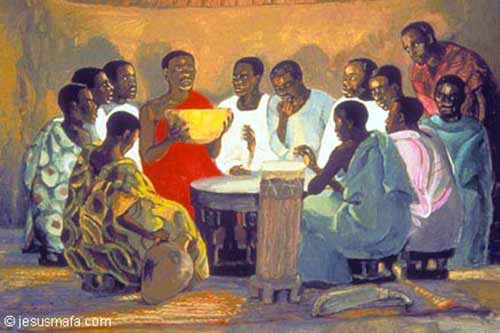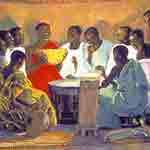
Liturgy has a bad name.
Liturgy is a bit like “Pharisee”. It doesn’t have a great image (we easily forget that both Jesus’ and St Paul’s basic beliefs were those of the Pharisees).
I belong to a Christian blogging network where the intention is that people support each other in their blogging. Admittedly, most members would call themselves “Evangelical”, but I commented once, within the group, that I very rarely received feedback or even acknowledgement within the group. The response from the leader of the group was telling. She said I should write about something other than the liturgy from time to time. It became evident she had not visited my site when I listed off some recent posts (they were as varied as recent ones which have included a discussion on the nature of truth, mindfulness, and ways of helping our inner life…).
So, it’s the word “liturgy” that is off-putting. Like the words “God”, “evangelism”, “creation”, “gospel”, “Christian” – these words are often seen through disparaging lenses.
People use the word “liturgy” to refer to the words we’ve agreed together to use in a service (yes – it’s usually the words that the pejorative attitude applies to – they barely notice that we have agreed actions, agreed signs, agreed symbols…).
But “liturgy” isn’t limited to what we have agreed to (vowed to!); “liturgy” refers to the whole service – all the agreed (required) parts, actions, and symbols and all the informal stuff, the hymns and other musical pieces, the sermon and prayers – the majority of the service, in fact. [Would the required parts make up any more than 5 or 10 minutes of a 75-minute service?!]
We reinforce the derogatory attitude to “liturgy” (even clergy do this!) by not having the agility to move comfortably between the agreed (5-10 minutes) and the rest of the service. The agreed material then has the feeling that we only do this “because we have to” (or we will get into trouble). And the impression is given, if we were left to our own devices, we would omit this unhelpful “liturgical” stuff. Clergy (or other worship leaders) debase the agreed material by, as it were, hiding behind it and peeking out from behind it with the real stuff from time to time.
Clergy even verbalise stage directions to themselves aloud! “And now I’m going to…” Or worse: “…now, in the words of the liturgy,…”
The word “liturgy” originally (ie. outside of its church context) meant the service that was done to keep society (our life together) functioning. It was the work we did together. It was the work we did for each other.
So “liturgy” means “service” [we still call a church’s liturgy, as I just have been above, a “service”].
“Liturgy” also became a synonym for “the Eucharist” – the Greek word for “thanksgiving”. Gratitude.
Could we get more positive than this? Liturgy: service and gratitude.
Sure, we can abandon a word once it is tainted. We’ve had to abandon the original meanings of “awful” and “prevent”. Do I really want to abandon the words “God”, “evangelism”, “Christian”, and “creation”? And “liturgy”?
What do you think?
If you appreciated this post, consider liking the liturgy facebook page, using the RSS feed, and/or signing up for a not-very-often email, …




I`ve always assumed that so-called Evangelical churches were increasingly incorporating liturgy into their worship. I would assume that your posts would be of particular interest.
Then again, it`s very easy for people to put others into such and such a category and close the door on them as one would a cabinet. I see quite a lot of that, actually, as a Roman Catholic. I`ve even been asked if I was a Christian!
I assume, too, that folks visit other sites that discuss liturgy and all they find there is a lot a arguing. That display is certainly off-putting, but I find nothing like that on your site, Bosco.
Keep on keeping on!
Thanks, Kevin.
That’s not so uncommon. In Mexico, many folks make a distinction between being Catholic and being Christian. When folks state that they are a Christian, they often mean that they are NOT Catholic and that they belong to some brand of Protestant or Evangelical church.
I think that what you have experienced is the prevailing attitude among average, lay Christendom at least in the US, where I am. The liturgical side publically espouses the benefits of the routine, while the evangelical side publically espouses that the routine keeps you from a personal relationship with God. But the secretive feelings about their own approach is very harsh. I’d almost love to take those two crowds and flip them for a measure to see what they think after truly experiencing the “other side”. If we have decided that we need to differentiate in schools to help all kids learn, why can’t we do that in religion, too? I, personally, have been raised in the evangelical traditions, but find myself starting to gravitate towards some liturgical traditions because I need that routine.
Thanks, “TB” [please, on this site, one of the ways that we keep a culture of more light than heat is by just using our ordinary name – if you are normally called “TB”, fine, otherwise please use your ordinary name here].
I appreciate your reflection. I wonder if the “personal relationship” people really act this way in their other “personal relationships”? Do they not say “Good morning” as the norm? Or “I love you”? Etc.
So I think of liturgy as the opposite: it is the normal way that we humans develop personal relationships.
Blessings.
Church Army NZ have reclaimed and re-owned the word evangelism in recent years, rather than scrapping it! We think it is worth the effort.
Thanks, Phil. Yes – and I want to do the same with “God”, “Creation”, “liturgy”, “love”, etc. Blessings.
We can abandon words or we can re-claim them with fresh meaning. I grew up Baptist, who claim that they don’t use liturgy but then do the same thing every week anyway. Becoming Anglican as an adult I have been fascinated with the liturgy and do find it meaningful, poetic and biblical. Do we get over accustomed to whatever type of service we experience until it becomes habit and loses some resonance. Therefore for whatever type of service we develop the question is where is the room for creativity that encourages us to explore and expand our expressions of worship.
Thanks, Christina. I’m with you on using the word “liturgy” to describe (and reflect on) services – whatever they are, however they are done. Baptists, then, from my perspective have liturgy as much as Eastern Orthodox. Blessings.
Reclaiming the word ‘liturgy’, and the power of that word within Church, is always worth the effort. It is often used as a pejorative (even my former bishop used it in that sense when he was trying to rile me) without a fuller understanding of what the word encompasses.
When I think of the word ‘liturgy’, I think not only of the agreed words, symbols, signs, actions, etc. but also of what happens once the ‘liturgy’ is “ended” (though it never truly ends of course). I would strongly contend that the word ‘liturgy’ also encompasses those things that the Church does outside the formal worship setting, extending to the missional and service tasks that are also part of the Church’s reason for existence and which, surprisingly enough, draw their source from what is done within the formal worship setting.
But then again, I am a ‘liturgist’…what would I know? I’m only concerned with rubrical fussiness if you ask some people.
You and I are absolutely on the same page, Fr Andrew (surprise!) The service has ended – the service has begun. The liturgy has ended – the liturgy has begun. As to rubrical fussiness – there was a reason I chose Pharisee in my post. And I already had in mind a part 2 of this post which will be exactly about this point: the importance and limitations of rubrical fussiness. Blessings.
Wow! I must live in a bubble. I’ve never heard reference to “liturgy” disparagingly. It’s good to know that others might see the word negatively, but it’s a surprise to me, personally.
I’m ready to abandon words like “Lord” “King” and even “Father” ….but not “liturgy”!
Even ‘non-liturgical’ churches have liturgy.
It’s just about marketing strategy, hon. “Liturgy” might mean exactly what you say it mean, but is that what the general public thinks about when they first see the word? Because that first thought is what gets people to click on things.
I do find it interesting that your post takes a stab at some random person in a group that made you feel offended. Not sure that’s what you intend on this blog.
Thanks, Drew.
So would you also change the words “God”, “Christian”, “spirituality”, “prayer”, etc – because of “what the general public thinks about when they first see the word”? I loathe the opposite – bait and switch. It is very common amongst churches. And on the internet.
I don’t identify with your second paragraph. I did not feel offended. It was a particular experience that led to my reflection how the word “liturgy” is seen negatively – even amongst Christians. Others commenting here identify with my experience. One person had only experienced the word as a positive. That’s been a helpful discussion. I intend to follow this with a further reflection.
Blessings.